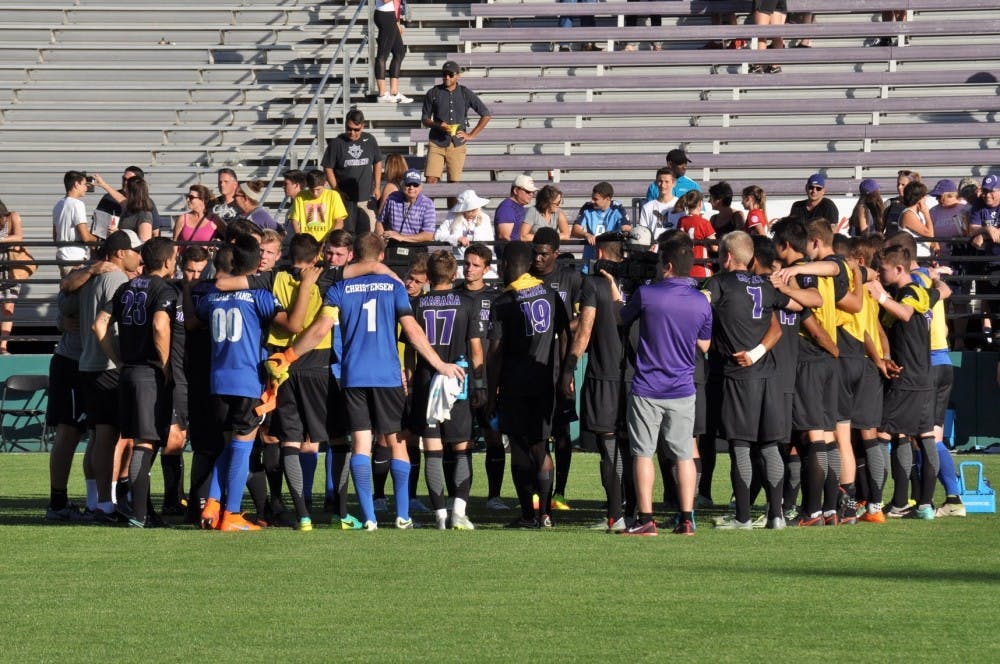On the evening of Aug. 26, I stood in the packed student section of Merlo Field. The Pilots’ men’s soccer team was about to face Wright State University in their first home game of the season. The sound of drums reverberated in the air. My fellow students, clad in their purple gear, cheered in unison. And it progressed into a deafening roar as the home team entered the field.
I made a quick glance towards the pitch to look at our players as they came out. I couldn’t believe what I saw. So I took another glimpse: A longer one.
Then I realized my eyes weren’t deceiving me. There really were four black guys on our soccer team. Four guys that looked like me. I couldn’t help but smirk a little.
But as happy as I was internally, I couldn’t help but wonder: Where did all the brothas come from?
Since I came to the University of Portland in the fall of 2013, the men’s soccer team each year has been predominately white. There was one black player on the team last year. Now, there are three more. Latinos are also well-represented and it’s safe to say we have players from all over North America, with guys ranging from as far north as Vancouver, British Columbia and as far south as Acapulco, Mexico (and one from Europe, too.)
The change in the team’s makeup is due largely to first year head coach Nick Carlin-Voigt. His reputation as one of the best recruiters in the country has translated smoothly to Portland. His first recruiting class on the Bluff was dubbed 17th best in the country. But Voigt doesn’t just look for talent. He wants diversity on his teams.
His teams at both UCLA and George Mason had players of various racial, ethnic and geographic backgrounds.
“Soccer is the most popular global game in the world and the game should represent the globe,” Voigt said.
And it appears to be the perfect time for a diversity-minded head coach.
Race is a hot button topic in Pilot country, much like it is everywhere else in the United States. Last year, two well-attended racial inclusion events got conversation started on a campus where race has traditionally been an uncomfortable topic. And this past August, University President Fr. Mark Poorman introduced a five-year plan that addresses diversity, the first time a UP strategic plan has done so.
While I do think that sports teams can be a platform for social causes, like diversity, they should not be the primary voice. Sport, at its root, is for entertainment. Just look at history. In its most rudimentary days in Ancient Rome, entertainment was the sole purpose of sports. Tens of thousands of spectators would gather in massive stadiums to watch people literally fight to the death in gladiatorial contests.
It’s great to see a more diverse team on Merlo. It’s comforting to know the coach is pushing for it. But to ask the men’s soccer team, or any other team, to lead the charge to racial inclusion on The Bluff is reckless.
“I wouldn’t say that our team is a vehicle for social change, but I do believe change can happen organically,” Voigt said.
The keys should be in the hands of those organizations whose sole purpose of existence is to address particular social issues. Take UP’s Black Lives Matter group for instance. They’ve been instrumental in starting race dialogue on our campus.
However, sports can play their part in holding the wheel. And that’s exactly what we’ve noticed in the last several months. From NBA players speaking out against racial oppressions at the ESPYs to Colin Kaepernick kneeling during the national anthem, sports can be a platform to drive conversation forward.
And what’s beautiful about sports is that we don’t look at them in black and white. We evaluate teams based on performance, not by the races of the players that make up a team.
“Sports are color blind,” Voigt said.
And even though we may still have a long way to go on racial inclusion, sports can unify us here on the Bluff. They show us what’s possible.
So when I look out onto the Merlo pitch, I can’t help but smirk.








